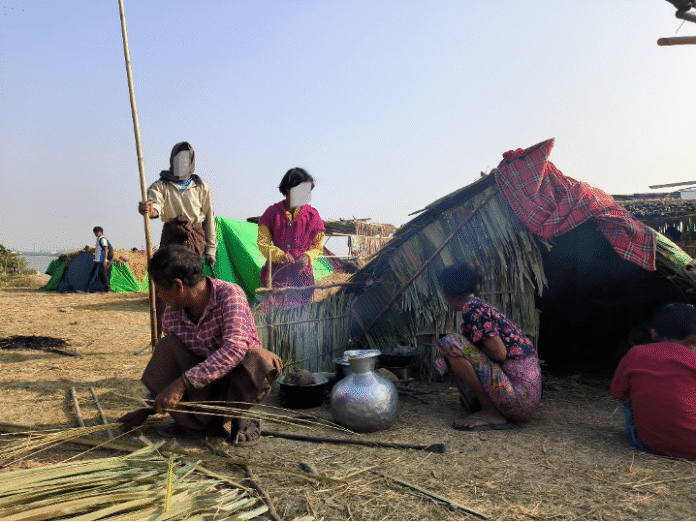An interview with a member of AA’s HDCO about the situation of IDPs in Arakan State
The conflict in Arakan State, which began in November 2023, has now lasted for almost a year and six months. The number of displaced people continues to rise, along with the intense fighting.
In addition, displaced people are facing reduced humanitarian aid, a lack of job opportunities, and rising commodity prices.
Meanwhile, the Humanitarian and Development Coordination Office (HDCO) of the Arakha Army (AA), is working to provide humanitarian support to those affected.
The AA’s HDCO also serves as a key mechanism for facilitating humanitarian aid and development efforts in the reconstruction of Arakan State.
Development Media Group (DMG) conducted this interview with a member of the HDCO about the current situation of displaced people amidst the ongoing military conflict, as well as future plans, including efforts to provide humanitarian assistance.
Q: Could you first tell us what the HDCO is doing regarding the situation in Arakan State?
A: HDCO is an office under the Arakha People’s Revolutionary Government that focuses on humanitarian and development issues in Arakan State. Its primary activities include delivering emergency assistance to displaced persons and working in collaboration with other organizations involved in humanitarian and development efforts.
Q: What is the current number of IDPs in Arakan State?
A: According to data collected by HDCO as of March 2025, there are over 80,000 households and more than 310,000 individuals displaced in Arakan State. However, due to limited phone and internet access, the actual number of displaced people, including new IDPs, is estimated to exceed 500,000. The number of displaced persons is rising in areas such as Gwa, Kyaukphyu, Ponnagyun, and Pauktaw Townships. On the other hand, there is a decline in the number of IDPs in the townships like Mrauk-U, Kyauktaw, Paletwa, Ramree, Thandwe, Minbya, Ann, Buthidaung, Rathedaung, and Maungdaw.
Q: What is the living condition of the IDPs?
A: IDPs are currently struggling with shortages of food, shelter, healthcare, and livelihood opportunities. The lack of clean drinking water has resulted in health issues such as diarrhea and skin diseases. As the rainy season approaches, there is a heightened risk of disease outbreaks, including dengue fever and influenza.
Q: How are you providing humanitarian assistance to displaced people, and what challenges are you facing?
A: We are working in collaboration to ensure that relevant organizations are aware of the urgent needs of displaced people. Additionally, we are facilitating connections between the relevant departments under the Arakha People’s Government and these organizations to ensure that aid reaches the areas of greatest need efficiently. There are organizations with strong collaboration and there are organizations with weak collaboration.
One of the main challenges is that many organizations lack the capacity to provide effective assistance in response to the evolving situation in Arakan State. This is compounded by insufficient funding and the absence of sustainable, long-term collaboration between international organizations, donor groups, and local civil society organizations. The disruption of commodity flow due to the junta’s “Four Cuts” strategy has further exacerbated the scarcity of humanitarian supplies and resources.
Q: We have heard that IDPs from Thandwe are currently suffering from hunger. What are their living conditions like?
A: There are over 20,000 displaced people in Thandwe Township, which has received limited emergency assistance from organizations. The people of Thandwe traditionally rely on the sea for their livelihoods, but due to the ongoing threat from the military council’s naval forces, fishing operations have been halted, and job opportunities are scarce. As a result, after more than a year of displacement, they are struggling to secure basic necessities. This has led some individuals to move to the northern townships in search of better conditions.
Q: Currently, since the displaced people are in an uncertain situation regarding returning to their homes, what plans have been made to help them get through the monsoon season?
A: For the displaced people who are still unable to return to their homes, it is necessary to continue providing emergency assistance, ensure they have access to proper shelter before the monsoon season, address healthcare needs, and create employment opportunities. These efforts are currently being implemented and will need to continue moving forward. Continued efforts will be made in collaboration with relevant organizations to support the return process — including mine clearance, repairing or rebuilding shelters, and restoring livelihoods through income-generating activities.
Q: What steps are you taking to ensure education for displaced children?
A: Currently, due to the heightened risk of airstrikes across all townships in Arakan State, the situation is not suitable for the education sector to operate schools as usual or for students and youth to gather for learning. Therefore, the Arakha People’s Government’s Department of Education is taking the lead in implementing context-specific and township-appropriate plans to ensure the continuity of education.
Sent by Aung Htein (DMG)

